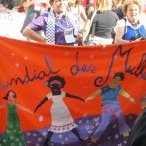English · Español

29 de agosto de 2013 | Noticias | 9ème Rencontre Internationale de la Marche Mondiale des Femmes | Anti-neoliberalismo | Género
Without Feminism there is No Socialism
Conference Shows Alternatives Built by Feminist Movement Around the World. The Cuban Example
Descargar: MP3 (1.2 MB)
The second day of activities of the 9th International Meeting of the World March of Women began with a conference called “Feminism and the Building of Alternatives”. Feminist activists from around the world spoke during the event and shared their local and regional experiences.
The event addressed the construction of feminism and the situation of women in different countries from socialist Cuba to the countries of Northern Africa and Middle East, which are going through rebellions and demonstrations. They also addressed the Latin American and global peasants and the specificities of the feminist struggle in Africa, more specifically in Mozambique.
After the opening of the delegation of Mozambique with traditional dances of the country and a short speech about violence against women there, Cuban Georgina Alfonso of the study group “Latin America: Social Philosophy and Axiology” opened the conference. She is also a member of the International Court of Women against Neoliberalism’s Patriarchal Violence.
Socialist and Feminist Cuba
Georgina’s speech focused on the struggle of women in Cuba, and the interpretation of the different struggles of the socialist revolution. She said there are different interpretations of what socialism and feminism are: “There are many views and theoretical conceptions of socialism, as well as feminism. Both concepts go together to overcome domination: not everyone who calls him/herself a socialist is and anti-capitalist. Not all the feminists are against patriarchy. We cannot build another world unless we end with the idea of producing and reproducing life. This is the socialism we are talking about, the one being built in Cuba, with many challenges and mistakes, but which has confronted the imperialistic powers of the world for 50 years”.
Georgina said that women have been the most revolutionary individuals in the Cuban revolution. She explained that “women had to break with their own culture, they had to overcome themselves, while men continued the patriarchal culture”.
She said: “progressive experiences continue divining the production and reproduction of life, they are not part of building a system an alternative of life”, the unity of these processes considered separate from each other.
Movement and Institution
Other aspects highlighted by Georgina were the relation between the institutional political system and the women’s movement. She said “It is no secret that parties and women’s movements come together in times of crisis, and once we are in power that unity is broken again and the progressive powers, the patriarchal power come back”. Likewise, women’s activism as well as their presence in political position dwindle”.








